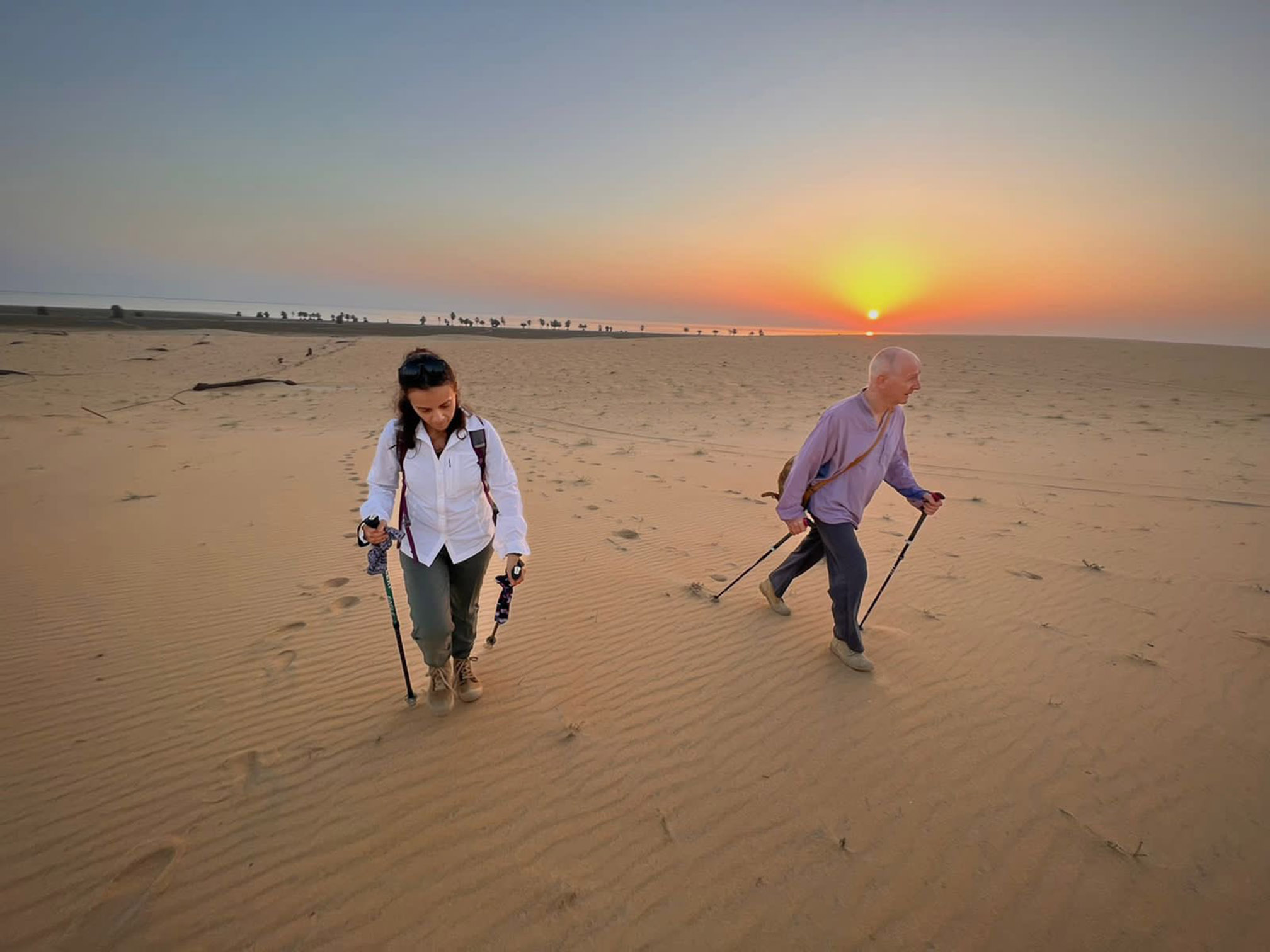KAUST Beacon Development joins Heart of Arabia expedition

KAUST's Reem Philby (left), Saudi explorer and the granddaughter of Saudi explorer Harry St John Abdullah Philby, the man who cross Arabia in 1917, and Heart of Arabia Expedition Leader Mark Evans (right) set out on the expedition's first leg, from Al Uqair to Riyadh, Saudi Arabia. Photo courtesy of Heart of Arabia
King Abdullah University of Science and Technology (KAUST) announced that subsidiary Beacon Development (KBD) is a key partner in the ambitious
Heart of Arabia expedition across Saudi Arabia. The data and observations generated by the Heart of Arabia team will support the work of scientific specialists looking to advance human performance in extreme environments as well as deepen their understanding of both pre-Islamic history and local biodiversity.
Harry St John Philby was the first European to cross the Rubʿ al-Khali, or Empty Quarter, of Arabia from east to west. His journey took place in 1917 on behalf of the future king of Saudi Arabia: ʿAbd al-ʿAzīz ibn Saʿūd. The British Explorer immortalized this in the 1922 book: "The Heart of Arabia."

A new expedition, traversing 750 miles on foot, by camel and 4x4s, will retrace Philby's footsteps. KBD is collaborating on this historical journey, where field notes and photographs from Philby's time can be compared to present-day conditions in the same areas. Leg One of the expedition took place November 15 - 29, 2022, leaving Al Uqair and arriving in Riyadh. The second leg, from Riyadh to Jeddah, will occur from January into February 2023. The high-profile expedition also has Royal Patronage from the United Kingdom, with the support of The Princess Royal, Princess Anne, who attended the launch event.

HRH The Princess Royal, Princess Anne (right) speaking with Heart of Arabia Expedition Leader Mark Evans (left), with HRH Prince Khalid bin Bandar Al Saud, Saudi Ambassador to the United Kingdom (center), joining the conversation. Photo courtesy of Heart of Arabia
KBD is a leader in environmental consulting services in Saudi Arabia, providing support and services to a wide range of giga-projects, government and corporate entities, and non-profit and local initiatives. The KBD Terrestrial Ecology and Conservation team has been advising the field science component of the expedition. To that end, they are lending a bat detector and a camera trap, which will enable expedition team members to collect critical information on elusive nocturnal species and gain initial results on their distribution. Involving expedition team members offers the opportunity to merge citizen science and exploration. KAUST will also organize, store and later analyze the important data gleaned from this advanced technology field.
Chief Operating Officer of KAUST Beacon Development (KBD) Mark Hull said, "The KBD Terrestrial Ecology and Conservation team is honored to serve as a key partner in the ambitious Heart of Arabia expedition. We will support the work of the scientific specialists conducting their in-depth study and research during the expedition, and we look forward to deepening our understanding of Saudi Arabia's environment and biodiversity."
"It is an honor to support the outstanding work undertaken by the terrestrial ecology team at KAUST. Saudi Arabia is almost ten times the size of the UK, but with less than half the number of people, so much of the country remains unsurveyed. We hope that our observations will add to our understanding of the rich biodiversity of the Kingdom," said Expedition Leader Mark Evans, executive director of Outward Bound Oman.

The Heart of Arabia Expedition team (from left): Alan Morrissey (logistics), Mark Evans (leader), Reem Philby (Saudi explorer) and Ana-Maria Pavalache (not shown; photographer). Photo courtesy Heart of Arabia
Other aims of the Heart of Arabia mission include a further study on extreme environment psychology. The team will collect and test a new digital app to measure performance and health in extreme environments. Additionally, they will observe lithic artifacts and record any evidence of ancient human presence to support the Green Arabia project.
KAUST is proud to join high-profile patrons and visionaries in this scientific adventure, which will transect Saudi Arabia, covering many habitats and providing observations most ecologists can only dream of. As a catalyst for innovation and economic development in Saudi Arabia, KAUST's Beacon Development's involvement in collecting these important datasets and records supports national strategies and Vision 2030.

